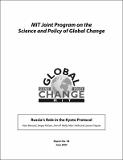| dc.description.abstract | As a result of the allocation of emissions reductions, and the differential willingness of countries to ratify, it turns out that Russia is a central player in the Kyoto Protocol. With the U.S. out and Japan and the EU ratifying, the Protocol cannot enter into force without Russian ratification. In part, U.S. rejection of the Kyoto Protocol resulted from the fact that, had the U.S. been in, its least costly road to implementation would have involved large purchases of emissions credits from Russia. With the U.S. out, Russian credits are worth much less but Russia may be able to exploit monopoly power to increase the value of those permits, or Russia could bank permits on the expectation that prices will rise in the future, perhaps as a result of the U.S. reentry into the Protocol in later periods. The Russian decision is more complex, however, in that it is also a major fossil fuel exporter. To the extent it withholds permits from the market, fossil energy prices are depressed further, and the value of its exports of energy are reduced. Thus, Russia faces a tradeoff between maximizing its permit revenue and its revenue from fossil energy exports. We develop this problem as a simple dynamic optimization problem and calibrate the model to the results of two CGE models (EPPA and GEMINI-E3) that fully capture interactions of energy trade, permit trade, and permit and energy prices. We show that carbon prices are relatively insensitive to Russia's behaviors when the U.S. is assumed to participate. It also shows that, in the absence of U.S. participation, the impact of market power by Russia and Ukraine is largely dependent on the elasticity of demand for permits. Finally, we focus on the uncertainty about the supply of CDM by developing countries. It is shown that permit prices are relatively insensitive to CDM supply in the short run but not in the long run. | en_US |
